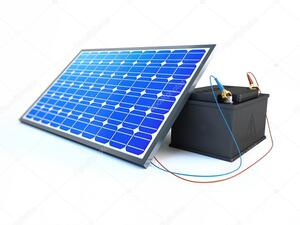Solar Battery Backup Systems: Are They Worth the Investment?
Corps
Solar battery backup systems have gained popularity as more homeowners and businesses seek reliable energy solutions. With the increasing demand for renewable energy, solar battery systems offer the convenience of storing excess energy generated by solar panels for later use. But are they truly worth the investment? In this article, we will explore the benefits, costs, and whether solar battery backups provide enough value for homeowners.
What is a Solar Battery Backup System?
A solar battery backup system is a device that stores the electricity generated by solar panels. Unlike a traditional grid-tied system, which relies on external electricity, solar batteries allow users to store energy and use it when needed, especially during power outages or peak electricity usage times. These systems offer more independence from the electrical grid, which is particularly useful in areas prone to blackouts or where grid electricity is expensive.
Key Benefits of Solar Battery Backup Systems
There are several advantages to installing a solar battery backup system. Let's explore the main ones:
1. Energy Independence
One of the most significant benefits of solar battery backup systems is energy independence. With a battery, you can store excess solar energy and use it when the sun isn't shining or during power outages. This reduces your reliance on the grid and ensures you have a backup during emergencies.
2. Lower Energy Costs
Solar batteries can help lower energy bills by allowing you to use stored energy during peak hours when electricity rates are higher. This practice, known as "time-of-use" optimization, ensures that you save money by avoiding high grid electricity costs. Over time, this can lead to significant savings on your utility bills.
3. Environmental Impact
Using solar batteries contributes to reducing your carbon footprint. Instead of relying on non-renewable energy sources like fossil fuels, solar energy is clean and sustainable. The stored energy in the battery can power your home without contributing to greenhouse gas emissions, making solar battery backup systems an eco-friendly option.
4. Increased Property Value
Homes equipped with solar battery backup systems are often seen as more valuable. Buyers are increasingly looking for energy-efficient homes with renewable energy solutions. Installing a solar battery system not only provides financial savings but can also boost your property’s marketability.
Costs Involved in Solar Battery Backup Systems
While the benefits are clear, the cost is an essential factor in deciding whether to invest in a solar battery backup system. These systems can range from affordable to quite expensive, depending on the type and capacity of the battery.
1. Upfront Costs
The initial investment includes the purchase of the battery itself, installation, and sometimes upgrades to your existing solar setup. On average, the cost of a solar battery can range from $5,000 to $10,000. However, the price can increase based on the battery's storage capacity and brand. For instance, high-capacity batteries that store more energy will naturally be more expensive.
2. Maintenance Costs
While solar battery systems generally require low maintenance, there may be occasional costs related to ensuring the battery remains in optimal condition. This could include replacing older batteries after several years of use.
3. New Battery Price
It’s essential to keep in mind that solar batteries are continuously improving, and their costs may decrease over time. If you're planning to buy a solar battery, comparing the new battery price for different brands and models can help you make an informed decision. Prices also vary by region, so checking local retailers or installers for quotes is essential.
Is It Worth the Investment?
Now that we’ve explored the benefits and costs, the question remains: Are solar battery backup systems worth it?
1. For Energy Savings
If your goal is to save on energy bills, especially if your area has high electricity costs, a solar battery backup system could be a valuable investment. By utilizing stored energy during peak hours or outages, you can reduce your reliance on the grid and save money in the long run.
2. For Power Reliability
In areas prone to frequent power outages, such as those with unreliable grid infrastructure or extreme weather conditions, a solar battery backup system can be crucial. It provides a reliable source of energy when the grid goes down, ensuring you don’t experience downtime.
3. For Environmental Impact
For environmentally conscious individuals, the ability to reduce reliance on non-renewable energy sources makes solar battery backup systems highly appealing. The sustainability and eco-friendliness of these systems add value beyond just financial savings.
Conclusion
Solar battery backup systems offer numerous benefits, including energy independence, lower energy bills, and a reduced carbon footprint. However, they come with an upfront investment and some maintenance costs. For those in areas with high electricity rates or frequent power outages, the investment can quickly pay for itself. Additionally, as the new battery price continues to become more competitive, the accessibility of these systems will increase.











commentaires